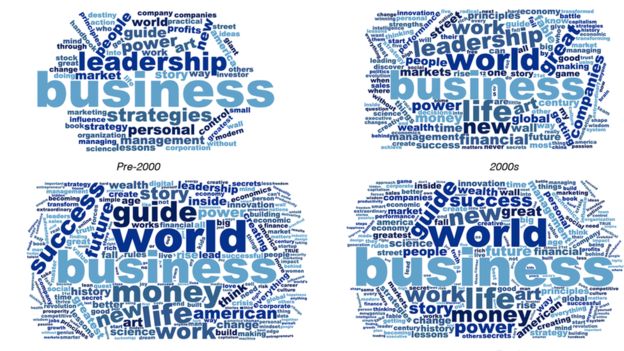商业励志书籍的那些流行词
The changing buzzwords of business books
编辑:给力英语新闻 更新:2018年1月17日 作者:米利亚姆·奎克(Miriam Quick)

让潜力得到释放,给效率开挂,把普通变得非凡。
Unlock your potential. Turbocharge your productivity. Transform the ordinary into the extraordinary.
励志书籍总会做出许多类似的夸张承诺。在美国每年出版的1.1万本商业书籍中,这类书占据相当比例。美国励志书籍和有声图书市场十分庞大:一年的产值高达15亿美元,其中还包括一些非商业书籍。
These are just some of the bombastic guarantees of self-help book titles, which make up a substantial portion of the staggering 11,000 business books published in the US every year. The US market for self-improvement books and audiobooks is huge: it’s worth over $1.5 billion a year, including non-business titles.
其中有哪些流行词和术语最为常见?当今这些刺激神经的陈词滥调与20年前流行的说法有何差异?
So, which ridiculous buzzwords and jargon dominate? And are there differences between the irritating clichés of today and those popularised 20 years ago?
为了找出结果,我们从各种畅销书单中收集了750本不同的商业书籍,包括《纽约时报》、《金融时报》和麦肯锡等机构评选的年度最佳畅销商业书。
To find out, I gathered around 750 different business titles from various best-of lists, including New York Times business best sellers, books longlisted for the Financial Times and McKinsey Business Book of the Year Award and others.
诚然,750本书的样本不够全面,而且多数书籍都是在1990年之后出版的,因而给结果带来了局限,但这个样本的规模的确足以揭示出一些问题。其中多数都是励志风格的书籍,但书单中也包含一些历史非虚构类图书、回忆录、经济和管理书籍、艾因·兰德(Ayn Rand)的小说以及苏斯博士(Dr. Seuss)部分图书。
To be sure, a sample of 750 isn’t comprehensive, and most of the books were published after 1990, which limits the conclusions you can draw, but it’s a large enough sample to reveal some insights. The majority are self-help style books, but the list also includes historical non-fiction and memoirs, economics and management tomes, the odd Ayn Rand novel and a sprinkling of Dr. Seuss.
意料之中的是,最常见的10个词汇似乎都很宽泛。所有商务书籍的标题和子标题中最常见的关键词是"商业",其次是"世界"、"生活"、"新"、"金钱"、"引导"、"工作"、"领导力"、"成功"、"权力"。
The ten most common words tend towards the generic, as you might expect. The top word across all business book titles and subtitles was – by a comfortable margin – ‘business’, followed by ‘world’, ‘life’, 'new', 'money', 'guide', 'work', 'leadership', 'success' and 'power'.
但对长期趋势进行分析,却会发现新的趋势涌现出来。
Analyse the trends over time, though, and fresh trends emerge.
把2000年之前发布的趋势与2000年代和2010年代的趋势进行对比便可发现,有一些词汇逐步受到欢迎,包括"金钱"、"世界"、"未来"和"企业家"。其他更加传统的词汇则逐步淡出视野,包括"战略"、"管理"、"领导力"甚至"市场"。
Comparing titles published before 2000 with those published in the 2000s and 2010s reveals a small crop of words that seem to be gaining in popularity, including ‘money’, ‘world’, ‘future’ and ‘entrepreneur’. Other more traditional business staples are going out of fashion, including ‘strategy’, ‘management’, ‘leadership’ and even ‘market’.
自由职业的兴起也意味着当今的商业书籍更有可能瞄准穿运动鞋的创业者,而非西装革履的公司高管。
The rise of the freelance economy also means today’s business books are more likely aimed at the start-up founder in sneakers than the suited company executive.

从2000之前到2010年代,"战略"和"领导力"逐步让位于"世界"、"未来"和"成功"等词汇
From pre-2000 to the 2010s, words like 'strategies' and 'leadership' give way to 'world', 'future' and 'success'.
2010年之后出现在书名中的"创业公司"一词指的可能是之前的书籍中所说的"小企业"——这个词只出现过两次,都来自2000年之前的书。
The word ‘start-up’ appears in book titles after 2010 to refer to what might earlier just have been termed ‘small businesses’ – a phrase that appears only twice, both times in books published before 2000.
这10年出现的其他新词还包括"数字化"、"数据"、"倾向"、"梦想"、"繁荣",以及"男性"和"女性"——可能是因为职场性别问题越发引人关注。像"追求"和"奋斗"这种词则表明人们向着更加好斗的"思维"转换("思维"也是2010年代的新词),这可能反映了在越发严酷的商业环境中进行斗争时所产生的感受。
Other new entries this decade include ‘digital’, ‘data’, ‘lean’, ‘dream’ and ‘prosperity’, as well as ‘men’ and ‘women’ – probably reflecting a growing awareness of workplace gender issues. Words like ‘quest’ and ‘fight’ suggest a shift to a more combative ‘mindset’ (also a new entry in the 2010s) perhaps reflecting the feeling of battling in an increasingly tough business environment.
但令人意外的是,科技词汇并没有给商业书籍带来太大的颠覆。"颠覆"本身只出现了三次,而虽然"革命"和相关词汇可能会越来越流行,但目前还很难在数字上体现出来。
Surprisingly tech speak has yet to disrupt the world of business books much, though. ‘Disrupt’ itself only gets three mentions, and while ‘revolutionise’ and related words might be getting more popular over time, it’s hard to tell from this number of titles.
数字列表Number crunching
大约有七分之一的书名包含数字,包括经典的《高能人士的7个习惯》(The 7 Habits Of Highly Effective People)、《权力的48条法则》(The 48 Laws of Power),以及蒂姆·菲瑞斯(Tim Ferriss)的畅销书《每周工作4小时》(The 4-Hour Workweek)。
Around one in seven titles contain numbers, including the classic ‘The 7 Habits Of Highly Effective People’, ‘The 48 Laws of Power’ and Tim Ferriss’ bestseller, a how to guide to escaping the rat race, ‘The 4-Hour Workweek’.
与其他类型的图书相同,在商业图书的标题中,作者和出版商都喜欢用列表来起书名。这种模式非常流行,例如《12种关键战略》(12 Key Strategies)、《21个无可辩驳的领导法则》(21 Irrefutable Laws of Leadership)和《提供一流服务的39个核心原则》(The 39 Essential Rules for Delivering Sensational Service)。
In business book titles, as in other genres, authors and publishers love a good list. Numbered lists of rules are stubbornly popular: ‘12 Key Strategies’, ‘21 Irrefutable Laws of Leadership’ and ‘The 39 Essential Rules for Delivering Sensational Service’ all make an appearance.
子标题也经常使用这种模式,通常会包含三个项目。最后一个能够真正抓住读者兴趣,例如:《财富不等人:避开7个财务陷阱,部署7个商业支柱,今天就完成生活的审计!》(Wealth Can't Wait: Avoid the 7 wealth traps, implement the 7 business pillars, and complete a life audit today!)
The subtitle will often be a list itself, typically containing three items. The last one will be the clincher that really piques the reader’s interest: ‘Wealth Can't Wait: Avoid the 7 wealth traps, implement the 7 business pillars, and complete a life audit today!’
最常见的两字词语是"如何",共出现在7%的书名里。最常见的3字词语是"……的艺术"(The art of),很可能都来自于《孙子兵法》(译注:英文直译为《战争的艺术》(The Art of War))这本中国古代的军事书籍。采用这种命名方式的包括《创新的艺术》(The Art of Innovation)、《创业公司融资的艺术》(The Art of Startup Fundraising)、《高管穿衣打扮的艺术》(The Art of Executive Appearance)和美国总统唐纳德·特朗普(Donald Trump)撰写的《交易的艺术》(The Art of the Deal),以及史蒂芬·普莱斯菲尔德(Steven Pressfield)的《战争的艺术:突破障碍,赢得内心的创造性战斗》(The War of Art: Break through the blocks and win your inner creative battles)。
The most common two-word phrase is ‘How to’, which occurs in 7% of titles.The most common three-word phrase is ‘The art of’, probably referencing Sun Tzu’s ‘The Art of War’, an ancient Chinese guide to military strategy. Titles that nod to Sun Tzu include ‘The Art of Innovation’, ‘The Art of Startup Fundraising’, ‘The Art of Executive Appearance’, Donald Trump’s ‘The Art of the Deal’ and, most cleverly, Steven Pressfield’s ‘The War of Art: Break through the blocks and win your inner creative battles’.
"科学"就没那么收欢迎了,例如:"……的科学"(The Science of)只出现了5次。
Science fares less well: ‘The Science of’ gets a paltry five mentions.
看透炒作Cutting through the hype
所有针对工作和领导力的新一代引导书籍都号称能给你带来金钱、权力和成功。这恰如其分地总结了所有励志类商业书籍最擅长的事情——用更美好、更富有、更高效的美好未来诱惑我们。而我们似乎都上瘾了。
Every new guide to the world of work and leadership brings the promise of money, power and success. This is an apt summary of what self-help business books do best – entice us with the sweet dream of a happier, wealthier, more productive future. And we’re addicted, it seems.
但随着出版行业陷入危机——美国每年的图书出版量大幅增长,但销量却陷入停滞——图书必须要通过夸张的名字才能引人关注。在标题中,企业很少优秀,总是伟大;业绩不仅满意,而且超群;目标不仅重要,而且极其重要;历史总是秘密的、规则总是隐秘的,而理念总是革命性的。
But with the publishing industry in crisis – in the US the number of books published annually is exploding, yet sales are stagnant – titles must ramp up the hyperbole just to get noticed. Companies are rarely good, always great. Performance is not just satisfactory, it’s outstanding. Goals are not just important, but wildly important. Histories are secret, rules hidden and ideas nothing short of revolutionary.
给人的感觉是:看过某一本书之后,你的职业不仅会改变,而且会彻底改变,你甚至能够征服世界。如果说这个世界有什么事情是确定的,那就是它充满了不确定性,而且异常复杂。
Read the book, and your career will not merely be changed, but transformed. You’ll be able to take on the world. And if there’s one thing we know about the world, it’s that it’s uncertain. And complex.
Going up
Money
World
Success
Inside
Future
Entrepreneur
Going down
Strategy
Management
Leadership
Market